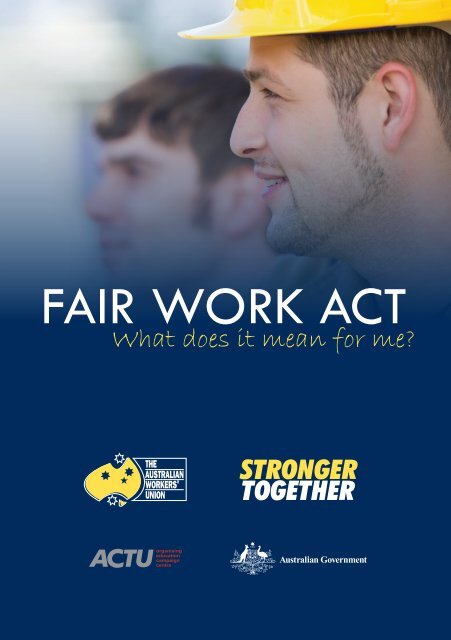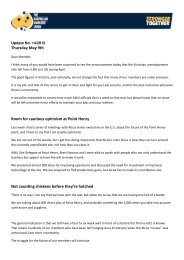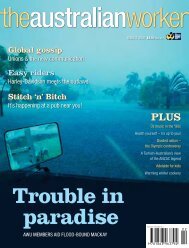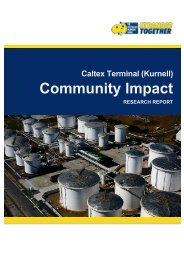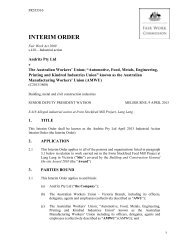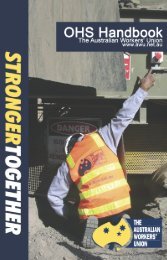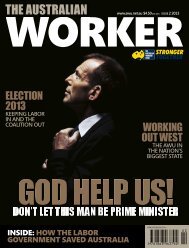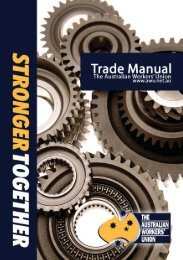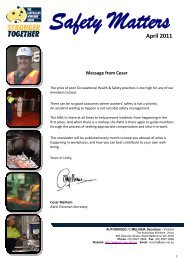Fair Work Act Booklet - The Australian Workers Union
Fair Work Act Booklet - The Australian Workers Union
Fair Work Act Booklet - The Australian Workers Union
Create successful ePaper yourself
Turn your PDF publications into a flip-book with our unique Google optimized e-Paper software.
FAIR WORK ACT<br />
What does it mean for me?
CONTENTS<br />
2 Glossary<br />
3 Introduction<br />
4 <strong>Fair</strong> <strong>Work</strong> Australia & Modern Awards<br />
6 Safety Net & What it means for workers<br />
8 Bargaining<br />
9 Agreements<br />
10 Unfair Dismissal<br />
12 Protections<br />
16 Key things to remember<br />
GLOSSARY<br />
• FWA <strong>Fair</strong> <strong>Work</strong> <strong>Act</strong><br />
• FWO <strong>Fair</strong> <strong>Work</strong> Ombudsman<br />
• EBA Enterprise Bargaining Agreement<br />
• NES National Employment Standards<br />
• AFPC <strong>Australian</strong> <strong>Fair</strong> Pay Commission<br />
• AWU <strong>The</strong> <strong>Australian</strong> <strong>Work</strong>ers’ <strong>Union</strong><br />
• Good Faith Bargaining requires employers and unions to use<br />
their best endeavours to agree to and implement an effective<br />
bargaining process.<br />
• Consultation Clause is a clause in an agreement stating that<br />
an employer is required to consult employees about major<br />
workplace changes.<br />
• Dispute Settlement Clause is a clause in an agreement that<br />
refers to the process by which disputes at workplaces are<br />
brought to an end.<br />
• Small Business <strong>Fair</strong> Dismissal Code is a code for small<br />
businesses to follow when dismissing an employee in order to<br />
make the dismissal fair.<br />
• Adverse <strong>Act</strong>ion is action considered to be unfavourable to an<br />
employee.
INTRODUCTION<br />
<strong>The</strong> <strong>Fair</strong> <strong>Work</strong> <strong>Act</strong> is the new set of national industrial relations<br />
laws which replaced <strong>Work</strong>Choices on July 1 2009.<br />
It is crucial that you understand the new system<br />
and how it applies to your workplace.<br />
What’s changed?<br />
•<br />
•<br />
•<br />
•<br />
•<br />
<strong>Australian</strong> <strong>Work</strong>place Agreements<br />
(AWAs) no longer exist.<br />
<strong>The</strong> fundamental right to bargain<br />
collectively is protected.<br />
<strong>Work</strong>ers are given additional protections.<br />
3 million workers are now covered<br />
by unfair dismissal protections.<br />
<strong>Work</strong>ers have rights to make<br />
complaints regarding employment<br />
www.awu.net.au<br />
3
FAIR WORK AUSTRALIA (FWA)<br />
<strong>Fair</strong> <strong>Work</strong> Australia is a government agency that provides a range<br />
of services for employees and employers. <strong>Fair</strong> <strong>Work</strong> Australia will<br />
replace the responsibilities and powers of the:<br />
•<br />
•<br />
•<br />
<strong>Australian</strong> Industrial Relations Commission<br />
<strong>Australian</strong> <strong>Fair</strong> Pay Commission<br />
<strong>Work</strong>place Authority<br />
<strong>The</strong> new system covers the majority of<br />
workplaces in Australia.<br />
Key elements of the new system are:<br />
• a legislated safety net of 10 National<br />
Employment Standards (NES)<br />
• new modern awards<br />
• revised enterprise bargaining<br />
arrangements<br />
• protections dealing with workplace<br />
and industrial rights, including<br />
protection against discrimination<br />
and unfair dismissal<br />
• two new organisations to regulate<br />
the system: <strong>Fair</strong> <strong>Work</strong> Australia<br />
and the <strong>Fair</strong> <strong>Work</strong> Ombudsman.
WHAT is an award?<br />
An award covers particular employers and workers and sets<br />
out minimum conditions of employment. For example, there are<br />
awards that cover employers and workers who are fruit pickers/<br />
packers and miners.<br />
Under the new system all existing awards have been<br />
modernised and consolidated updating basic conditions and<br />
entitlements for all industries.<br />
An award will not apply when an enterprise agreement<br />
applies.<br />
www.awu.net.au<br />
5
SAFETY NET<br />
<strong>The</strong> new safety net consists of ten National<br />
Employment Standards (NES) and new modern<br />
awards. NES are minimum standards.<br />
If you have an agreement at your workplace<br />
its conditions cannot undercut NES.<br />
WHAT does it mean for me?<br />
<strong>The</strong> NES cannot be traded off, its ten conditions are the<br />
absolute minimum guarantee.<br />
AGREEMENT/S<br />
• are made between employers<br />
& workers about terms and conditions of<br />
employment. It acts independently of the Award<br />
but does not undercut NES<br />
• AWARD is an enforceable document containing<br />
employment conditions. <strong>The</strong>y build on the NES<br />
and contain more extensive conditions<br />
• NES is the absolute minimum standard terms &<br />
conditions for an employee
WHAT are the NES Minimum Standards?<br />
• 38 hour week & right to refuse unreasonable overtime<br />
• 24 months parental leave<br />
• Flexible working hours<br />
• 4 weeks annual leave + 1 more for some shift workers<br />
• 10 days personal/sick/carers leave<br />
• Employees to be informed about rights when starting<br />
employment<br />
• 2 days compassionate/emergency leave<br />
• Unpaid community service leave<br />
• All national and state public holidays<br />
• Long service leave<br />
• Redundancy leave<br />
•<br />
Notice of termination & redundancy pay<br />
www.awu.net.au<br />
7
BARGAINING<br />
WHAT is bargaining?<br />
Bargaining is the process by which one or more employers<br />
and employees negotiate a collective agreement that<br />
covers wages and conditions of employment.<br />
Either side may be represented in the process<br />
by a bargaining representative.<br />
Within 14 days of agreeing to bargain, an employer must<br />
notify workers of their right to representation.<br />
WHO can bargain?<br />
A union can be the bargaining representative for workers. That is the<br />
AWU can be your bargaining representative Employers must recognise<br />
and bargain with the workers’ representative.<br />
WHAT does bargaining mean for workers?<br />
Bargaining gives workers a say in their workplace rights and conditions.<br />
Both employers and unions must bargain in good faith. For example,<br />
they should attend meetings and respond to requests for information.<br />
If parties don’t bargain in good faith, parties<br />
can apply to FWA to intervene.<br />
If a majority of workers in a workplace want a collective<br />
agreement, the employer must bargain with their union<br />
and/or any other bargaining representative.<br />
YOUR bargaining rights:<br />
• <strong>The</strong> right to be represented by a union, the AWU<br />
• <strong>The</strong> right to see an agreement 7 days prior to voting<br />
• <strong>The</strong> right to vote on an agreement
AGREEMENTS<br />
WHAT is an agreement?<br />
It is an agreement made between employers and employees about<br />
terms and conditions of employment.<br />
WHAT can be in an agreement?<br />
•<br />
•<br />
•<br />
•<br />
•<br />
•<br />
Wages and wage increases<br />
Conditions such as penalty rates, allowances, classifications and<br />
leave<br />
<strong>Union</strong> training leave<br />
Paid time off to participate in union activities<br />
<strong>Union</strong> participation in consultation and dispute settlement<br />
Ensuring contractors cannot be used to undercut regular<br />
employees.<br />
IN addition all your agreements must have:<br />
• A consultation clause - an employer is required to consult<br />
employees about major workplace changes.<br />
• A flexibility clause - allows changes to working conditions<br />
in order to meet the needs of the employer and employee.<br />
<strong>The</strong>se agreements must be in writing and can be terminated<br />
by either the employer or employee giving 4 weeks notice<br />
• A nominal expiry date - 4 years or less<br />
• A dispute settlement procedure allowing representation. For<br />
example, if a group of workers are in dispute about their<br />
overtime not being paid, they can have a union negotiate on<br />
their behalf to resolve the dispute.<br />
Agreements must pass the BOOT or Better Off Overall Test.<br />
This means they must leave workers better off than the<br />
relevant award.<br />
www.awu.net.au<br />
9
UNFAIR DISMISSAL<br />
WHAT’S Unfair?<br />
A worker has been unfairly dismissed if <strong>Fair</strong> <strong>Work</strong> Australia finds<br />
that:<br />
•<br />
•<br />
•<br />
they were dismissed<br />
the dismissal was harsh, unjust or unreasonable, and<br />
the dismissal was not a case of genuine redundancy.<br />
It’s not an unfair dismissal if the employer is a small business<br />
employer (employs fewer than 15 full time equivalent employees)<br />
and they follow the Small Business <strong>Fair</strong> Dismissal Code.<br />
WHERE to go for help?<br />
If you believe you’ve been<br />
unfairly dismissed you can<br />
apply to FWA for assistance.<br />
You must apply to FWA within 14<br />
days after a dismissal takes effect,<br />
although FWA may accept late<br />
applications. <strong>The</strong>re is an application<br />
fee of $59.50 but this may be waived.<br />
Contact <strong>The</strong> AWU for more<br />
information on 1300 885 653<br />
To make a claim you must<br />
have completed the minimum<br />
employment period of at least<br />
six months (12 months if your<br />
employer is a small business).<br />
Billy, a green keeper,<br />
has been working at<br />
Atlas Golf Course for 13<br />
months.<br />
Atlas Golf Course<br />
employ 25 hospitality<br />
staff and 6 green<br />
keepers. Two weeks<br />
ago the manager told<br />
Billy that they no longer<br />
required him to work<br />
and dismissed him.
WHAT happens next?<br />
•<br />
•<br />
FWA will check the application to see if its complete.<br />
<strong>The</strong>y will notify your employer.<br />
11<br />
• A conciliation will be arranged to assist both sides to resolve<br />
the matter by agreement.<br />
• If a resolution can’t be reached a conference will be held and<br />
if FWA find the dismissal was unfair your employer can be<br />
ordered to either:<br />
• reinstate you (give you back your job), or<br />
• compensate you for up to 26 weeks pay.<br />
Remember...your AWU organiser can work<br />
with you through this process<br />
Billy contacted his union,<strong>The</strong> AWU, who told him that this was<br />
not allowed under the <strong>Fair</strong> <strong>Work</strong> <strong>Act</strong> 2009. Fortunately for him,<br />
employers cannot unfairly dismiss anyone who has completed a<br />
12 month minimum period of employment.<br />
Billy was reinstated.<br />
• This is a case study. All decisions of FWA will be based on the individual<br />
circumstances and merits of the matter<br />
www.awu.net.au
PROTECTIONS<br />
<strong>The</strong> general protections provisions of the <strong>Fair</strong> <strong>Work</strong> <strong>Act</strong> 2009 (the<br />
<strong>Act</strong>) aims to protect workplace rights and freedom of association<br />
and provide protection from workplace discrimination.<br />
WHAT is discrimination?<br />
Direct discrimination occurs when someone<br />
is treated unfairly or less favourably in the<br />
same or similar circumstances because, for<br />
example, of their gender or race.<br />
Indirect discrimination occurs when there is<br />
a rule, policy, practice or procedure that is<br />
the same for everyone, but has an unequal<br />
or disproportionate effect for a specific<br />
group of people.<br />
WHAT about <strong>Union</strong><br />
membership?<br />
All employees have the right to<br />
join or not join a union.<br />
<strong>The</strong>y must not be pressured by the<br />
union or employer or any other person<br />
to make a decision about joining or not joining a union.<br />
Important! An employer cannot dismiss an<br />
employee based on whether or not they’re a union<br />
member or involved in union activities.<br />
Every worker has the right to join a union
•<br />
Joan, 39 has worked at AZV for 18 months. She has been<br />
overlooked for promotion twice in favour of men who started later<br />
than her. She feels she has been discriminated against by her<br />
employer because she is woman. She can now make a complaint<br />
to FWA on the grounds of discrimination.<br />
This is a case study. All decisions of FWA will be based on the individual<br />
circumstances and merits of the matter<br />
13<br />
www.awu.net.au
PROTECTIONS<br />
WHAT is a workplace right?<br />
A workplace right is an entitlement<br />
under an award or agreement or a<br />
workplace law. For example employees<br />
are entitled to be paid for all hours<br />
worked including meetings or training.<br />
An employer must not take any<br />
adverse action against an employee<br />
because they have a workplace right,<br />
have exercised a workplace right, or<br />
propose to exercise a workplace right.<br />
An employer must not take any adverse<br />
action against a worker (or prospective<br />
worker) because of his or her race,<br />
colour, sex, sexual preference, age,<br />
physical or mental disability, marital<br />
status, family or carer’s responsibilities,<br />
pregnancy, religion, political opinion,<br />
national extraction or social origin.<br />
In addition, an employer must not<br />
dismiss a worker because he/she<br />
is temporarily absent from work<br />
because of illness or injury.
•<br />
Tom and Maura worked at TZM Holdings for over a<br />
year. <strong>The</strong>y suspected they were being underpaid and<br />
approached their boss. <strong>The</strong> boss started to harass and<br />
intimidate them before he dismissed them both.<br />
<strong>The</strong>y contacted their union, <strong>The</strong> AWU. <strong>The</strong>ir union believe<br />
this happened because they complained about their<br />
entitlements. <strong>The</strong> manager is now being prosecuted.<br />
<strong>The</strong> <strong>Fair</strong> <strong>Work</strong> Ombudsman claims the company has<br />
breached the workers’ right of freedom of association.<br />
<strong>The</strong> maximum penalty per breach is $33,000<br />
This is a case study. All decisions of FWA will be based on<br />
the individual circumstances and merits of the matter<br />
15<br />
www.awu.net.au
KEY THINGS TO REMEMBER<br />
•<br />
A worker has the right to join a union.<br />
• <strong>The</strong> NES can’t be traded off, these are the absolute minimum guarantee.<br />
Awards and agreements can provide better standards but not worse ones.<br />
• Employers must recognise and bargain with your union<br />
and any other bargaining representative.<br />
• If a majority of workers in a workplace want a collective<br />
agreement, the employer must bargain with their union<br />
and/or any other bargaining representative.<br />
• If you believe you’ve been unfairly dismissed contact<br />
your union or the FWA for assistance.<br />
• <strong>Work</strong>ers have the right to make a complaint about their<br />
working conditions and not be discriminated against for it.<br />
• AWU Members have the right to be represented by their union<br />
THE AUSTRALIAN WORKERS’ UNION<br />
1300 885 653<br />
www.awu.net.au<br />
FAIR WORK OMBUDSMAN<br />
13 13 94<br />
www.fwo.gov.au<br />
FAIR WORK ONLINE<br />
13 13 94<br />
www.fairwork.gov.au<br />
FAIR WORK AUSTRALIA<br />
1300 799 675<br />
www.fwa.gov.au<br />
UNIONS AUSTRALIA<br />
1300 4 UNION<br />
www.unionsaustralia.com.au<br />
ACTU<br />
1300 362 223<br />
www.actu.asn.au<br />
Authorised by Paul Howes, AWU National Secretary


